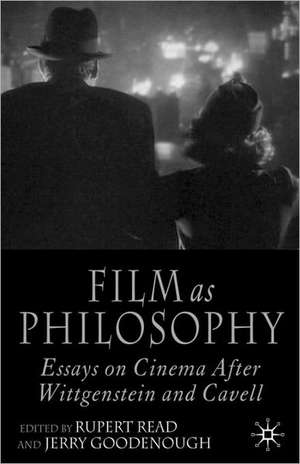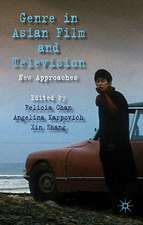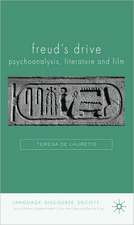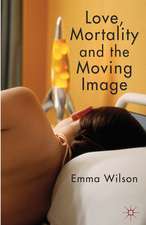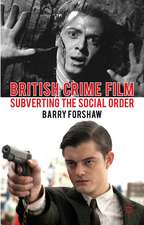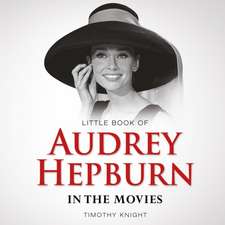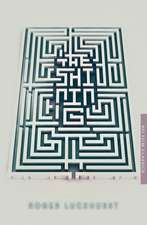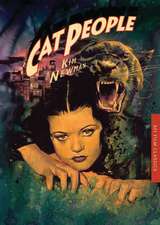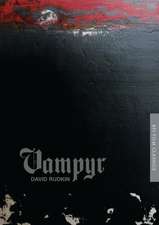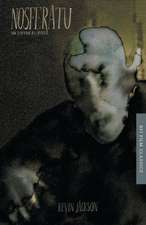Film as Philosophy: Essays in Cinema after Wittgenstein and Cavell
Editat de R. Read, J. Goodenoughen Limba Engleză Paperback – 27 sep 2005
Preț: 468.57 lei
Preț vechi: 551.26 lei
-15% Nou
Puncte Express: 703
Preț estimativ în valută:
89.66€ • 93.62$ • 74.04£
89.66€ • 93.62$ • 74.04£
Carte tipărită la comandă
Livrare economică 15-29 aprilie
Preluare comenzi: 021 569.72.76
Specificații
ISBN-13: 9781403997951
ISBN-10: 1403997950
Pagini: 234
Ilustrații: IX, 219 p. 6 illus.
Dimensiuni: 140 x 216 x 15 mm
Greutate: 0.35 kg
Ediția:2005
Editura: Palgrave Macmillan UK
Colecția Palgrave Macmillan
Locul publicării:London, United Kingdom
ISBN-10: 1403997950
Pagini: 234
Ilustrații: IX, 219 p. 6 illus.
Dimensiuni: 140 x 216 x 15 mm
Greutate: 0.35 kg
Ediția:2005
Editura: Palgrave Macmillan UK
Colecția Palgrave Macmillan
Locul publicării:London, United Kingdom
Cuprins
List of Plates Preface Notes on Contributors Introduction I: A Philosopher Goes to the Cinema; J.Goodenough Introduction II: What Theory of Film do Wittgenstein and Cavell have ?; R.Read PART I: ESSAYS Cogito Ergo Film: Plato, Descartes and Fight Club ; N.Bauer In Space No-one can Hear you Scream; S.Mulhall Memento : A Philosophical Investigation; P.Hutchinson & R.Read The Everydayness of Don Giovanni; S.Glendinning Silent Dialogue: Philosophizing with Jan Svankmajer; D.Rudrum Calm: On Terence Malik's The Thin Red Line ; S.Critchley Habitual Remarriage: The Ends of Happiness in The Palm Beach Story ; S.Klawans PART II: INTERVIEW What Becomes of Thinking on Film?: Stanley Cavell in Conversation with Andrew Klevan Bibliography Index
Recenzii
'A collection of articles on individual films both interesting in itself, and fascinating as a sign of the fruitful and widespread impact on thinking about movies that Stanley Cavell's work is beginning to have. To top it off, there is a conversation with Cavell (conducted by Andrew Klevan) that is, by itself, worth the price of admission.' - Professor Stanley Bates, Department of Philosophy, Middlebury College, USA
'...a fine collection of writings by a new generation of philosophers interested in looking anew at film as philosophical practice. Rather than merely using cinema to illustrate classic philosophical positions, each endeavours to see film as a potential source of philosophical insight. In this respect it represents a wholly new view of the relationship between image and thought.' - Dr John Mullarkey, Department of Philosophy, University of Dundee, UK
'Building on the work of Wittgenstein and Cavell, this anthology draws our attention to ways in which film can be understood as philosophical texts and movie-goers can engage in philosophical investigation. In an assessable format, each author expertly guides us through issues related to memory, identity, reality and appearance, myth, the nature of self, free moral choice, Otherness, and conditions for personhood. In these pages are puzzle-games, jokes and riddles, feminist nightmares, and food for thought surrounding male violence, cannibalism, and myriad narratives about voice, voicelessness,dislocated voices, and the concept of order. We are drawn into discussions about camera angles, color, light and dark, voiceovers, pacing, and music.
The topics raised in these pages are so compelling they call for course development. Philosophical ideas are extended as they are placed in context of the relatively new medium of film. As we learn from these authors, by learning to 'read' films, the potential exists to expand the focus of philosophical engagement from university classrooms to the more public space of the movie theatre. As David Ruben claims, films 'tempt us toward philosophical insight'. Film as philosophy is an idea, and a book, that can be easily embraced.' - Professor Kristin Congdon, Department of Art and Department of Philosophy, University of Central Florida, USA
'...a fine collection of writings by a new generation of philosophers interested in looking anew at film as philosophical practice. Rather than merely using cinema to illustrate classic philosophical positions, each endeavours to see film as a potential source of philosophical insight. In this respect it represents a wholly new view of the relationship between image and thought.' - Dr John Mullarkey, Department of Philosophy, University of Dundee, UK
'Building on the work of Wittgenstein and Cavell, this anthology draws our attention to ways in which film can be understood as philosophical texts and movie-goers can engage in philosophical investigation. In an assessable format, each author expertly guides us through issues related to memory, identity, reality and appearance, myth, the nature of self, free moral choice, Otherness, and conditions for personhood. In these pages are puzzle-games, jokes and riddles, feminist nightmares, and food for thought surrounding male violence, cannibalism, and myriad narratives about voice, voicelessness,dislocated voices, and the concept of order. We are drawn into discussions about camera angles, color, light and dark, voiceovers, pacing, and music.
The topics raised in these pages are so compelling they call for course development. Philosophical ideas are extended as they are placed in context of the relatively new medium of film. As we learn from these authors, by learning to 'read' films, the potential exists to expand the focus of philosophical engagement from university classrooms to the more public space of the movie theatre. As David Ruben claims, films 'tempt us toward philosophical insight'. Film as philosophy is an idea, and a book, that can be easily embraced.' - Professor Kristin Congdon, Department of Art and Department of Philosophy, University of Central Florida, USA
Notă biografică
NANCY BAUER Assistant Professor of Philosophy, Tufts University, USASIMON CRITCHLEY Professor of Philosophy, New School for Social Research, USASIMON GLENDINNING Fellow in European Philosophy, European Institute, London School of Economics, UKSTUART KLAWANS Film Critic, The NationANDREW KLEVAN Lecturer in Film Studies, University of Kent, UKPHIL HUTCHINSON ResearcherSTEPHEN MULHALL Fellow and Tutor in Philosophy, New College, Oxford, UKDAVID RUDRUM Lecturer, Goldsmiths College, University of London
